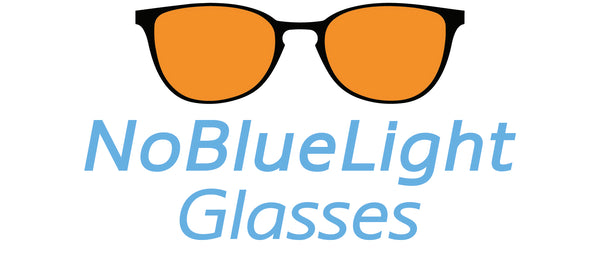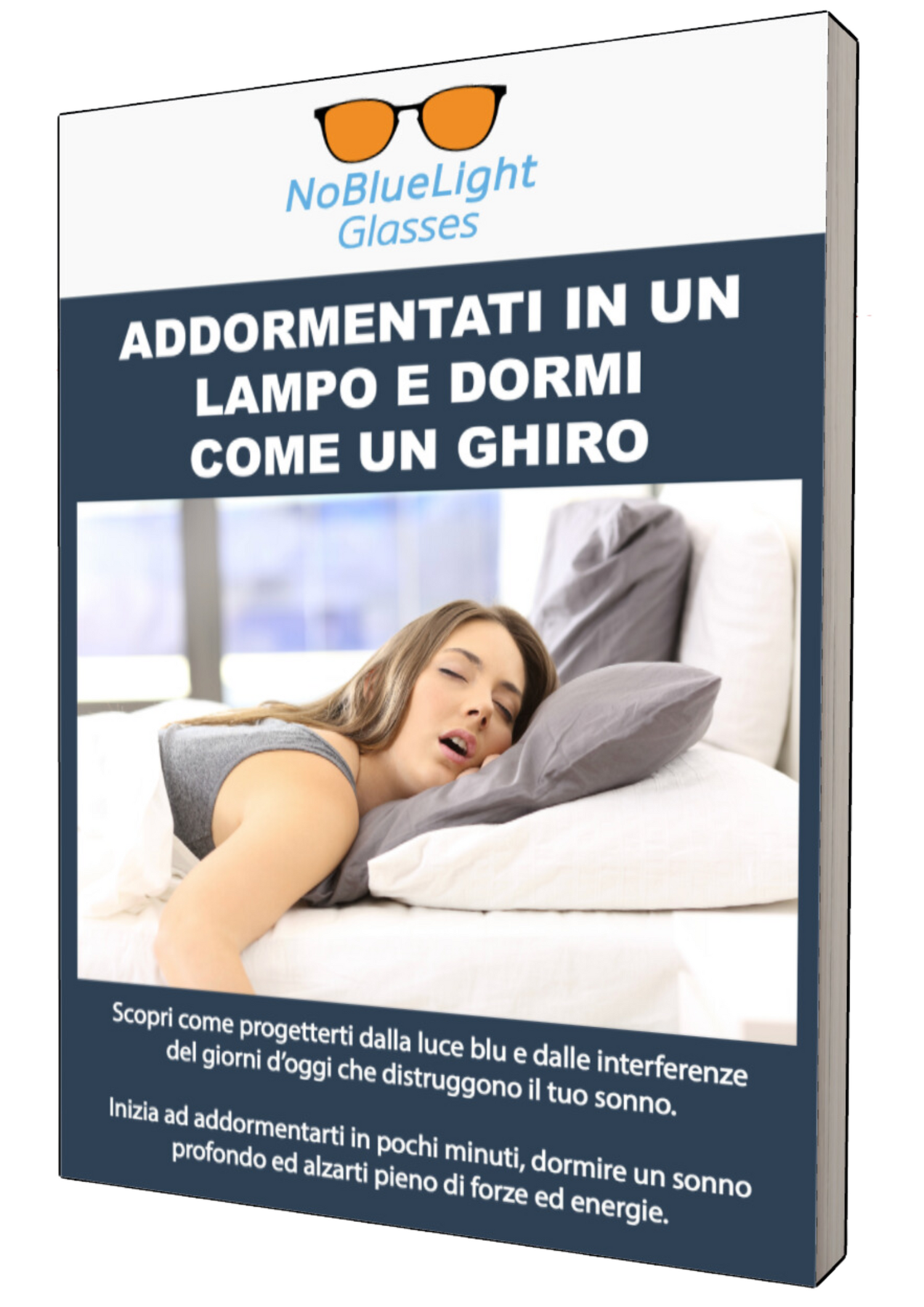
Blue light filter: because it has become fundamental ?
Share
Have you ever thought about how much our way of life has changed in the last 20 years?
Technology has transformed every aspect of our daily lives.
From online shopping to video calls with our loved ones, from distance learning to smart working…
But the worst is what happened to our evening habits…
In the evening, many people have the habit of using their smartphones, PCs or watching TV even until before going to sleep…
What do all these activities have in common?
THE BLUE LIGHT.
Our eyes, our sleep, and our health are fighting a silent battle against an invisible enemy: blue light.

Think about the typical evening we live in these modern times…
PC, TV, social networks, video calls with friends or family, a film on Netflix… all these activities expose us to the screens of our electronic devices, which emit large amounts of blue light.
But these are not the only sources of blue light to which we are exposed in the evening…
Even simple LED bulbs, which replaced halogen ones in 2018, emit high amounts of blue light…
What does this blue light do to our body and why is it necessary to filter it?
We were never exposed to blue light until a few decades ago…
Until a few years ago, phones had much smaller, less bright screens and no LED technology…
Same thing for TVs.
Besides that, until a few years ago there were no streaming platforms like Netflix and Social Networks were not yet as widespread as they are today…
The bulbs were halogen and emitted an almost negligible amount of blue light compared to the LED ones of today…
The worst part?
These habits are constantly increasing.
Young people are going out less and less and are spending more and more time scrolling through social networks or watching television…

More and more workers have to sit in front of the PC, that is, exposed to an ever-increasing amount of blue light…
What does this mean for our body and why do we need a filter for this blue light?
First things first… what is blue light and why is it harmful?

Blue light is a natural component of sunlight.

In nature it is emitted only by the sun during the central hours of the day.
However, for a few decades now it has also been emitted in large quantities by the screens of our electronic devices such as smartphones, TVs, PCs, tablets, etc.
The problem?
Our bodies are not designed to handle this prolonged exposure to blue light, especially in the evening.
We have seen that the sun emits blue light only during the central hours of the day…
In the morning and at sunset, however, as you can see below, the light emitted by the sun contains very small amounts of blue light.
However, for a few decades now our body has been exposed to blue light even in the evening, without any filter…
This can cause damage to our body, which often begins to manifest itself with these symptoms, which vary from person to person:
• Difficulty falling asleep;
• Insomnia;
• Light and unrefreshing sleep
• Visual fatigue;
• Dry eyes;
• Blurred vision;
• Frequent headaches;
• Difficulty concentrating.
These symptoms are often underestimated…
However, In the long term, excessive exposure to blue light can lead to more serious damage to the retina of our eye and alter our biological clock.
This can cause an worsening of the symptoms listed above.
Blue light damage to sleep
53% of Italians have problems with sleep, as reported in this article from “Il Sole 24 Ore”...
These sleep problems have literally exploded in recent years, the same years in which our exposure to blue light has increased.
Let's see why…
The damage that blue light causes to our sleep is “indirect”.
What does it mean?
It means that Exposure to blue light does not cause any damage to our sleep, but these are caused by the hormonal imbalance that being exposed to blue light causes in our body.
Let's take a closer look at how it works.
The blue light emitted by the sun during the central hours of the day serves to communicate to our brain that it is daytime and therefore keeps us awake and active.

To do this, our body produces cortisol, also known as the “stress hormone”.
At the same time, our brain blocks the production of melatonin, also known as the “sleep hormone.”
In the evening, however, this process is reversed:
The absence of blue light after sunset tells our brain to produce melatonin, the hormone that has the task of making us fall asleep in a few moments and making us sleep well.
At the same time, the production of cortisol, the hormone that keeps us awake and active, is blocked…
Unfortunately though, this doesn't happen anymore nowadays…
The blue light emitted by the artificial lighting in our homes and the screens of our electronic devices tricks our brains...
By detecting this artificial blue light, our brain thinks it is still daytime…
This blocks the natural production of melatonin.
The result?
Trouble falling asleep and light, unrefreshing sleep.
This leads to being less productive during the day, sleepy and with little energy.
Many people are told that they are lazy or unmotivated, but the reality is that they may be having these sleep problems caused by overexposure to blue light in the evening.
Blue Light Damage to the Eyes

The damage that blue light causes to the eyes is instead “direct”.
The burning sensation and tiredness are the most common.
Our eyes were not “designed” to be exposed to blue light after sunset.
In the modern world we live in, we bombard our eyes with blue light until we go to bed.
This also happens at close range from screens through the use of PCs and smartphones…
In addition to burning and tiredness, there are other damages to the eyes caused by blue light…
When we look at the screens of our electronic devices, we blink less.
This often causes dry eyes and eye strain.
Sleep and eye problems are the most common, short-term damage caused by blue light.
However, there are other medium and long-term damages that exposure to blue light causes.
Let's see what they are before seeing how to solve all these problems naturally, without drugs and without supplements.

Medium and long-term damage caused by exposure to blue light:
1- Predisposition to the risk of chronic diseases such as diabetes, obesity and cardiovascular diseases.
The chronic lack of our body's natural melatonin, in addition to the sleep problems we have seen, can also have repercussions on our metabolism and the functioning of the body in general.
This predisposes to the risk of chronic diseases such as diabetes, obesity and cardiovascular disease.
2- Mood swings and increased risk of depression.
Poor or disturbed sleep directly impacts emotional stability and mood regulation, exacerbating existing conditions, creating new ones, and increasing stress.
3- Damage to the immune system
Evening exposure to blue light alters our body's biological clock. This weakens the immune system, making the body more susceptible to infections and diseases.
4- Reduction in cognitive performance
Artificial blue light can affect cognitive performance, causing difficulty concentrating, reduced attention span, and memory problems.
Who is most at risk of damage from blue light exposure?

The people most at risk of suffering from damage caused by blue light are simply those who receive the greatest quantities of it.
In particular, the people most at risk are:
• People who use their smartphone or computer for several hours;
• Professionals who work many hours on the computer;
• Students and young people who use digital devices for study and in their free time;
• Video game enthusiasts who spend many hours in front of screens;
• Anyone who uses smartphones, tablets or watches TV in the evening hours.
How can you protect yourself from the harm of blue light?
Protecting yourself from blue light in modern life is very complicated.
Blue light is everywhere.
Almost all people use electronic devices in the evening, even before going to sleep.
This exposes them to dangerous amounts of blue light emitted by their screens and the potential harm that light causes.
Not only that.
For a few years now, Almost all of the lighting in our homes uses LED technology.
This technology emits a very high amount of blue light.
Halogen bulbs, which emitted small amounts of blue light, were outlawed due to energy-saving policies.
In Italy this happened in 2018.
This has effectively forced citizens to install (and replace once broken) all light bulbs in their homes with LED ones.
This means that, in addition to the screens, just having the lights on at home after sunset is enough to expose you to dangerous amounts of blue light.
Below you can see the difference in blue light emitted by a halogen bulb and an LED bulb:

Did you notice the difference between the two?
The halogen bulb, although it suppressed melatonin production, did so by about 40%.
The light bulbs we have at home now do this up to 80%, double!
But this is the least serious thing…
In the last few years, in addition to having installed LED lights everywhere, we have dramatically increased the time spent in front of the screens of our electronic devices…
Recently, platforms like Netflix and Amazon Prime have accustomed us to spending several hours a week in front of the screen…

Not to mention how much the use of social networks has increased in the evening…
Facebook, Instagram, WhatsApp, TikTok and social media in general are a consolidated habit in Italian evenings.
This has dramatically increased our exposure to blue light.
To confirm the problems that blue light causes, we saw earlier the article reported by “Il Sole 24 Ore”, which states that 53% of Italians have problems with their rest.
But not only that: the increase in sleep aids reported in this study, is the confirmation:

In 2000, the global market for sleep aids was $22.5 billion.
In 2010, it was $50 billion.
In 2020, it was $81.2 billion
By 2025, it is estimated to reach a whopping $112.7 billion.
Vision problems have also grown dramatically in recent decades, to the point where today more than 1 in 2 Italians wears glasses…
What happened in the same years that I literally have sleep and vision problems skyrocketed?
The amount of has increased exponentially blue light to which we are exposed in the evening. In particular, the use of electronic devices has increased and therefore the exposure to the blue light emitted by their screens, even before going to sleep.
So let's see how it is possible to protect ourselves from the damage of blue light.
2 solutions to protect yourself from blue light







